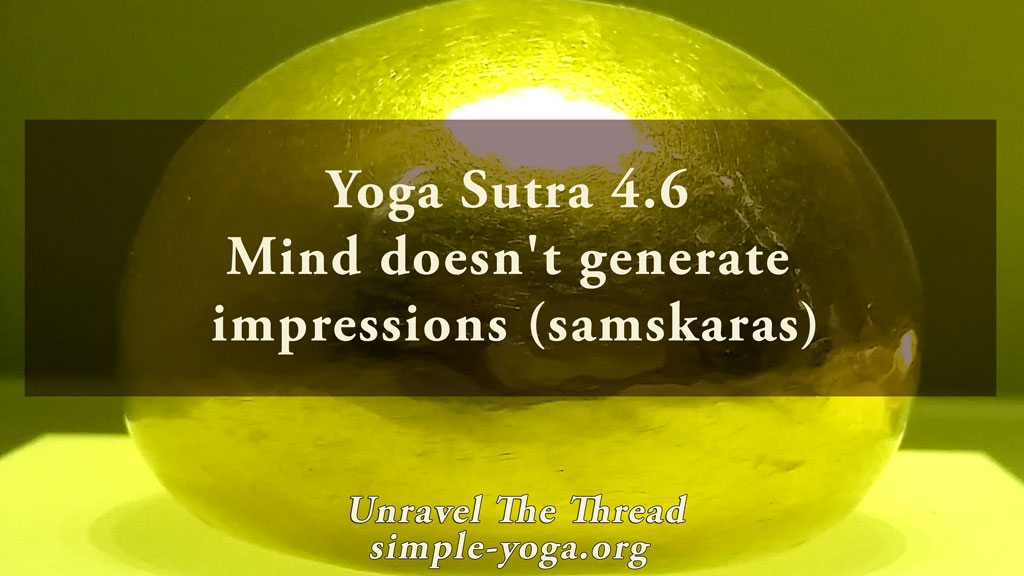
4.5 Single underlying awareness
July 6, 2022
4.7 Karma of three kinds
July 24, 2022
4.5 Single underlying awareness
July 6, 2022
4.7 Karma of three kinds
July 24, 20224.6 Mind doesn’t generate impressions (samskaras)

4.6 The yogi’s mind, stilled in meditation, does not generate or accumulate new subconscious impressions (samskaras), because its perception is not clouded by its ways of being.
Of the five paths to gain supernatural powers listed in sutra 4.1, only one path is established in meditation, that is the samadhi path. The other paths –birth, herbs, purification practices (tapas) and mantra – use external ways of gaining these attainments. Because these actions are external, they will generate echoes in the world, subconscious impressions (samskaras) that will result in future activities. According to this sutra, only the path that is based on meditation (samadhi) will not produce new impressions. In other words, the external paths are short-lived and therefore not sustainable, while the meditation path (samadhi) does not require the yogi to rely on external elements and is, thus, reliable and sustainable. Also, since samadhi brings the yogi into the natural state, the yogi’s sense of self (asmita) is free from all identification and, thus, free from expectations and attachments to the results.
All actions have ramifications. The root of each action includes your intention and your attitude. When your actions are grounded in the natural state, free from the conflict between likes and dislikes, the ramifications of your actions do not become a burden or a source of future suffering as it was pointed out in aphorisms 2.15 and 2.16. Also, in Chapter Two of the Yoga Sutra, Patañjali indicated that the afflictions (klesha) dissolve when the sense of self dissolves into consciousness (2.10) and that meditation is a way to counteract the activities resulting from the afflictions (2.11).
Having reached this level of practice, although you still live in the world and participate in life through your actions and interactions, your actions spring from your emotional balance and unclouded awareness. As a result, your actions do not leave lasting emotional impressions (samskaras) that will otherwise generate future experiences gravitating around your sense of self, your likes, your dislikes, or your sense of self-importance.
Are any of your actions caused by your sense of self-importance?
To what extent are you free from the manipulations of your likes and dislikes? What motivates your actions?
How do you know if your actions result from your deep emotional balance?
Are you clear on your intentions?
As usual, one more way of exploring the meaning of this sutra is by chanting it.
You can choose to chant it in its traditional form with some of the words coming together:
4.6 tatra dhyānajamanāśayam
तत्र ध्यानजमनाशयम् ॥६॥
Another option is to chant each word in the sutra individually:
- tatra
- dhyānajam
- anāśayam
If you prefer, you may listen to the podcast:
This is an excerpt from the book Unravel the thread: Applying the ancient wisdom of yoga to live a happy life
If you find Simple-Yoga.org and Unravel the thread useful, consider supporting my labor with a donation, you may also donate using PayPal or Venmo. Thank you!
